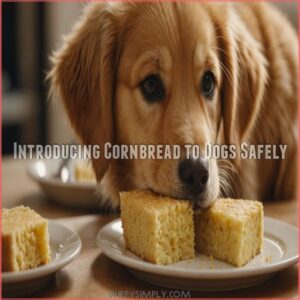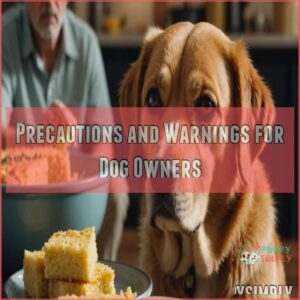This site is supported by our readers. We may earn a commission, at no cost to you, if you purchase through links.
 You can share a bit of cornbread with your furry friend, but don’t go overboard!
You can share a bit of cornbread with your furry friend, but don’t go overboard!
Plain cornbread is generally safe for dogs in moderation.
However, watch out for ingredients like butter, onions, or garlic that can upset your pup’s tummy or even be toxic.
Keep portions small – a 2-inch square is plenty for a little dog.
While cornbread offers some fiber and protein, it’s not a nutritional powerhouse for your pooch.
Some dogs might be sensitive to corn, so keep an eye out for itchy skin or tummy troubles.
There are more things to think about regarding cornbread and canines, including some tasty alternatives your dog might prefer.
Table Of Contents
- Key Takeaways
- Can Dogs Eat Cornbread?
- Allergies and Sensitivities in Dogs
- Nutritional Value of Cornbread
- Health Risks Associated With Cornbread
- How Much Cornbread is Safe for Dogs?
- Store-Bought Vs. Homemade Cornbread
- Introducing Cornbread to Dogs Safely
- Expert Tips on Feeding Cornbread
- Alternative Treats and Snacks for Dogs
- Precautions and Warnings for Dog Owners
- Frequently Asked Questions (FAQs)
- Can dogs eat pinto beans and cornbread?
- Is cornmeal good for dogs to eat?
- Can dogs eat jiffy corn muffin mix?
- Is cornbread ok for a dog?
- Can puppies eat cornbread?
- Is cornbread good for dogs with diabetes?
- How does cornbread affect a dogs digestion?
- Can cornbread help with a dogs upset stomach?
- Does cornbread provide any dental benefits for dogs?
- Conclusion
Key Takeaways
- You can give your dog plain cornbread in moderation, but it’s not nutritionally beneficial for them.
- Watch out for harmful ingredients like onions, garlic, or excessive butter in cornbread recipes.
- Keep portions small – a 2-inch square is plenty for a little dog to avoid weight gain and digestive issues.
- If your dog shows signs of corn sensitivity or allergy, such as itching or an upset stomach, stop feeding them cornbread and consult your vet.
Can Dogs Eat Cornbread?
If you’re wondering whether to share your cornbread with your four-legged friend, you’ll be happy to know that plain cornbread is generally safe for dogs in moderation.
While your pup can enjoy this tasty treat occasionally, you’ll need to watch out for harmful ingredients like butter, onions, or garlic that might upset their stomach.
Cornbread Ingredients to Avoid
Your furry friend’s wagging tail might make you want to share that warm slice of cornbread, but if you’re considering sharing breakfast cereal like Cheerios instead, remember that dogs eating Cheerios should only be done in moderation due to their low nutritional value. Watch out for these dangerous ingredients that could turn your pup’s treat into trouble.
While plain cornbread can be okay occasionally, many recipes contain ingredients that aren’t safe for your four-legged friend.
It’s also essential to keep in mind the risks associated with other popular treats, like unhealthy popcorn options, which can cause digestive issues and choking hazards if not prepared correctly.
Here are the top ingredients to avoid:
- Onions and garlic can cause toxic anemia in dogs
- Excessive butter and salt can lead to pancreatitis
- Spicy seasonings and artificial sweeteners can upset your dog’s stomach
Remember, even if your cornbread recipe is a family favorite, it’s better to skip sharing if it contains these potentially harmful ingredients.
Safe Ingredients for Dogs
While some ingredients spell trouble for our furry friends, plenty of safe options make tail-wagging treats.
Plain cornmeal, whole wheat flour, and eggs create a dog-friendly cornbread base that won’t send you rushing to the vet.
Think of it like building with pet-safe Legos – stick to simple ingredients you can count on one paw!
A splash of milk or a dollop of plain yogurt adds moisture without worry.
Skip the sugar rush and opt for natural sweeteners like mashed bananas or applesauce.
Now that’s what we call putting the "treat" in dog treat!
Allergies and Sensitivities in Dogs
If you’ve noticed your dog scratching more than usual after eating cornbread, they might’ve a grain sensitivity or allergy.
While corn allergies aren’t common in dogs, they can cause uncomfortable symptoms like itchy skin, diarrhea, or vomiting that you’ll want to watch out for.
Signs of Food Allergies
Dogs can experience adverse reactions to cornbread just like humans, so it’s important to spot the warning signs early.
That lovely loaf of cornbread mightn’t sit well with every pup’s tummy, leading to some telltale symptoms of food allergies.
For example, chronic itchiness in the ears, skin irritation, vomiting, and diarrhea are key symptoms of common dog food allergies.
Here are the key signs to watch for:
- Skin-related issues: Persistent scratching, skin rashes, or itchy paws that drive your dog nuts
- Digestive troubles: Unexpected vomiting or diarrhea that shows up within hours of eating
- Overall health changes: Noticeable weight loss or changes in energy levels
If you notice these symptoms, it’s time for a chat with your vet.
Grain Allergies and Sensitivities
Just like humans can’t handle certain foods, some pups get the jitters when it comes to grains.
Common triggers include wheat, corn, and soy – key ingredients in most cornbread recipes.
If you notice your furry friend scratching more than usual or dealing with tummy troubles after treats, they might’ve grain sensitivities.
Keep an eye out for digestive problems like bloating or upset stomach.
Many pet parents find success with grain-free alternatives that still satisfy their dog’s treat cravings.
Before making dietary changes, chat with your vet about the best management plan for your four-legged friend’s specific needs.
Nutritional Value of Cornbread
You’ll find that cornbread isn’t just tasty for your four-legged friend – it actually contains some beneficial nutrients like fiber, protein, and essential vitamins.
While it’s not a nutritional powerhouse for your pup, you can feel good knowing a small piece offers some folic acid and amino acids as an occasional treat.
Carbohydrates and Protein
Understanding the carb-protein ratio in cornbread can make you a smarter pet parent.
Now that you know about potential allergies, let’s look at what’s actually in that golden slice. Traditional cornbread packs quite a nutritional punch, with about 4 grams of protein and 30 grams of carbohydrates per serving.
When shopping for dog cornbread recipes, consider visiting a dedicated dog cornbread recipe store.
- Your pup needs a balanced diet with 18-25% protein content
- Store-bought cornbread often contains more carbs than homemade versions
- The amino acids in cornmeal can support muscle health
- A 2-inch square provides roughly 180 calories – much like the excessive pasta consumption that can lead to health problems in dogs, as seen with whole grain pasta risks. that’s like a small dog eating a whole hamburger!
Remember, moderation is your best friend when sharing this tasty treat.
Fiber, Vitamins, and Minerals
Let’s talk about the hidden gems in your pup’s cornbread treat.
While it’s not a superfood, cornbread does pack some nutritional punch.
You’ll find fiber that keeps your furry friend’s digestion on track, like a well-oiled machine.
Just like how small breeds need nutrient-dense diets with high-quality protein sources, treats like cornbread should be considered as part of their overall dietary needs.
It’s also got a sprinkle of vitamins and minerals, including folic acid, which plays a key role in your dog’s overall health.
But don’t get too excited – cornbread isn’t exactly a vitamin powerhouse.
Think of it as a tasty bonus rather than a health food.
Remember, moderation is key to keep your pooch’s tail wagging without tipping the scales.
Health Risks Associated With Cornbread
While cornbread might seem harmless, it can pose some health risks for your furry friend.
You’ll want to watch out for upset tummies and potential weight gain if your pup indulges in this tasty treat too often.
Gastrointestinal Distress
While cornbread might seem like a tasty treat, it can wreak havoc on your pup’s tummy.
Think of it as a roller coaster ride for their digestive system – fun at first, but potentially leading to an upset stomach.
Your furry friend might experience symptoms like vomiting, diarrhea, or gas.
It’s not exactly a picnic for them or you!
Keep an eye out for these signs of gastrointestinal distress.
If your dog gobbles up cornbread and starts feeling under the weather, don’t panic.
Monitor them closely and contact your vet if symptoms persist.
Remember, every dog’s digestive system is unique, so what’s a treat for one might be trouble for another.
Obesity and Weight Gain
Your dog’s waistline could be in danger if cornbread becomes a regular treat.
This calorie-dense snack can quickly lead to weight gain, tipping the scales of your pup’s health.
Remember that Dog obesity prevention tips emphasize the importance of balancing treats with regular exercise and a healthy diet.
To keep your furry friend fit, remember:
- Moderation is key: Treat cornbread as an occasional snack, not a daily indulgence.
- Size matters: Adjust portions based on your dog’s size and activity level.
- Balance is essential: Offset treats with exercise and a healthy diet.
Excess weight can strain your dog’s joints and organs, potentially shortening their lifespan.
Instead of store-bought options, try homemade low-calorie alternatives.
Your vet can offer expert tips on weight management and recommend healthier treats that’ll keep tails wagging without expanding waistlines.
How Much Cornbread is Safe for Dogs?
You’re probably wondering how much cornbread your furry friend can safely enjoy.
Let’s look at the right serving sizes and factors that affect safe consumption, so you can treat your pup without worry.
Serving Size and Portion Control
Now that we’ve covered the risks, let’s talk portion sizes.
Regarding cornbread for your furry friend, think bite-sized.
For a healthier alternative, consider making homemade dog treats using simple ingredients like oats, pumpkin puree, and peanut butter.
A small dog (around 10 lbs) can enjoy a 2-inch square or 3 crumbled tablespoons as an occasional treat.
Remember, cornbread is calorie-dense – a 1.5 oz muffin packs 180 calories!
That’s a big chunk of your pup’s daily intake.
It’s like giving your dog a tiny slice of the cornbread pie, not the whole shebang.
Moderation is key to keeping tails wagging!
Factors Affecting Safe Consumption
Let’s dig into what affects how much cornbread is safe for your furry friend.
Your dog’s size, age, and activity level play a big role.
A Great Dane can handle more than a Chihuahua, just like a puppy needs less than an adult dog.
The cooking method matters too – plain, baked cornbread is better than fried.
You can also consider special cornbread dog treats like those found in online stores cornbread dog treats.
Watch those ingredients!
Stick to simple recipes without harmful add-ins.
Cornbread type is key; whole grain is healthier than sugary versions.
Remember, even the safest cornbread should be an occasional treat.
Think of it like dessert for humans – a little goes a long way!
Store-Bought Vs. Homemade Cornbread
In terms of treating your furry friend, you might wonder if store-bought or homemade cornbread is better.
While homemade allows you to control the ingredients, store-bought versions often contain preservatives and additives that could upset your pup’s tummy.
Preservatives and Additives
Store-bought cornbread often contains carbohydrates like simple carbs, which may not provide sustained energy for your pup, unlike complex carbohydrates such as sweet potatoes and brown rice found in some dog food ingredients list. Store-bought cornbread often hides a secret ingredient list that could make your pup’s tail droop.
While portion control matters, what’s inside counts too.
For a safer option, consider dog safe cornbread.
Many packaged cornbreads come loaded with preservatives like BHA and BHT that mightn’t sit well with Fido.
Preservative safety is a hot topic, so it’s worth checking those food labels carefully.
Remember, in terms of cornbread, sometimes less is more for your four-legged friend.
Safety of Homemade Cornbread
Baking your own cornbread for Fido? You’re barking up the right tree! Homemade cornbread lets you control the ingredients, making it a safer treat for your furry friend.
Skip the sugar and salt, and you’re golden. Stick to simple recipes with cornmeal, whole wheat flour, and eggs.
Remember, cornbread’s still a treat, not a meal replacement. Keep portions small – think bite-sized pieces, not slices.
Got a puppy? Wait until they’re older before introducing cornbread.
Always check with your vet first, especially if your pooch has allergies or sensitivities.
With these cornbread safety tips, you’ll be the top dog in your pup’s eyes!
Introducing Cornbread to Dogs Safely
Keeping a watchful eye is key when introducing cornbread to your furry friend.
Start with a tiny morsel and observe closely for any adverse reactions.
Watch for signs like tummy troubles, itchy skin, or unusual behavior.
If all’s well, you can gradually increase the portion size, but remember, moderation is the name of the game.
Stick to plain, homemade cornbread without harmful ingredients.
It’s better to be safe than sorry, so if you notice any red flags, don’t hesitate to put the brakes on this tasty experiment.
Your pup’s health always comes first!
Expert Tips on Feeding Cornbread
You’re about to become a cornbread connoisseur for your canine companion. Let’s explore some expert tips to keep your pup happy and healthy while enjoying this tasty treat.
Consulting With a Veterinarian
Before you start serving cornbread to your furry friend, it’s wise to consult with your vet.
They’ll consider your dog’s health history, including food allergies and dietary restrictions.
When choosing safe treats, it’s essential to consider what can dogs eat from mcdonald’s, as some popular options can be toxic. Your vet might recommend safe treats designed for your pup’s needs.
They can also advise on portion sizes and frequency.
If you’re worried about health concerns, your vet can offer peace of mind.
Remember, every dog is unique, so what works for your neighbor’s pooch mightn’t suit yours.
Think of your vet as your canine cuisine coach – they’ll help you make the best choices for your four-legged foodie.
Avoiding Overfeeding and Obesity
The scale doesn’t lie – overfeeding your pup can lead to a roly-poly pooch!
Cornbread is a calorie-dense treat, so portion control is key.
Stick to the 10% rule: treats shouldn’t make up more than a tenth of your dog’s daily calories.
For a small dog, that’s about a 2-inch square or 3 tablespoons crumbled.
Balance is vital in your furry friend’s diet.
Consider healthy alternatives like carrot sticks or apple slices.
If you’re worried about your dog’s weight, chat with your vet about a personalized weight management plan.
Remember, a fit pup is a happy pup!
Alternative Treats and Snacks for Dogs
You don’t have to limit your pup’s treats to cornbread.
There are plenty of safe, healthy alternatives that’ll make your dog’s tail wag just as much, without the worry of harmful ingredients.
Healthy Snack Options
You’ve got options galore in terms of dog-friendly treats!
While cornbread might be tempting, there’s a whole world of healthier snacks out there.
Let’s explore some tail-wagging alternatives that’ll have your pup drooling:
- Crunchy carrot sticks for a satisfying chew
- Frozen banana slices to beat the heat
- Homemade peanut butter and pumpkin biscuits for a special treat
- Bite-sized apple chunks for a sweet surprise
Fresh vegetables like zucchini and squash, rich in vitamins and fiber, make a great alternative to processed treats, can dogs eat raw zucchini and squash. These nutritious snacks pack a punch without the risks of cornbread.
Plus, they’re easy on your wallet and a breeze to prepare.
Your furry friend will thank you with slobbery kisses and a wagging tail!
Avoiding Toxic Ingredients
While healthy snacks are great, it’s equally important to steer clear of toxic ingredients.
Your furry friend’s safety is paramount, so let’s break down what to avoid.
Here’s a quick rundown of no-no ingredients and safer alternatives:
| Toxic Ingredients | Safe Alternatives |
|---|---|
| Onions | Carrots |
| Garlic | Green beans |
| Excessive salt | Plain popcorn |
| Added sugar | Apple slices |
Remember, even "safe" foods can be harmful in large quantities.
Think of treats like seasoning – a little goes a long way.
When in doubt, stick to dog-specific snacks or ask your vet.
Your pup’s wagging tail is worth the extra caution!
Precautions and Warnings for Dog Owners
If you’re thinking about sharing cornbread with your furry friend, you’ll want to avoid some common pitfalls.
While a little cornbread can be a tasty treat, knowing that even something as harmless as uncooked rice, like uncooked rice risks, can be a choking hazard or cause gastrointestinal upset in dogs.
Common Mistakes to Avoid
Overfeeding cornbread is a common blunder that can lead to a pudgy pooch.
Don’t fall into this trap!
Keep portions small and infrequent.
Watch out for toxic ingredients lurking in your cornbread recipe.
Onions, garlic, and certain spices can spell trouble for your furry friend.
Steer clear of extra sugar and salt, too.
These sneaky additives might taste great to us, but they’re no-nos for dogs.
Stick to plain, homemade cornbread without the bells and whistles.
Remember, moderation is key.
Treat your dog like you’d treat yourself after Thanksgiving dinner – a little goes a long way!
Emergency Situations and Veterinary Care
To avoid a ruff situation, be on the lookout for signs of cornbread poisoning in your furry friend.
If your dog’s eaten a large amount or cornbread with harmful ingredients, don’t wait to call the vet.
Watch for vomiting, diarrhea, or unusual lethargy.
Time is of the essence in these situations.
Keep your vet’s number handy and know the closest emergency animal hospital.
Remember, it’s better to be safe than sorry regarding your pup’s health.
- Your heart races as you watch your dog gobble up that forgotten cornbread
- Panic sets in when you realize it contained onions
- Relief washes over you as the vet picks up on the first ring
- A wave of gratitude hits as your pup gets the all-clear after treatment
Frequently Asked Questions (FAQs)
Can dogs eat pinto beans and cornbread?
Your pup can enjoy small amounts of plain, cooked pinto beans and plain cornbread as occasional treats.
Keep portions tiny, though!
Too much can upset their tummy.
Always check with your vet before introducing new foods.
Is cornmeal good for dogs to eat?
Did you know cornmeal‘s about 7% protein?
It’s not a doggy superfood, but it won’t hurt your pup in small amounts.
Stick to plain cornmeal as an occasional treat.
Watch for allergies, and always put your dog’s balanced diet first.
Can dogs eat jiffy corn muffin mix?
While Jiffy corn muffin mix isn’t toxic, it’s not ideal for your pup.
It’s packed with sugar, salt, and preservatives that aren’t dog-friendly.
Stick to plain, homemade cornbread as an occasional treat instead.
Your dog’s tummy will thank you!
Is cornbread ok for a dog?
Plain cornbread’s usually safe for dogs in small amounts.
It’s not toxic, but it’s no nutritional powerhouse either.
Think of it as an occasional treat, not a staple.
Watch out for added ingredients that could upset your pup’s tummy.
Can puppies eat cornbread?
You shouldn’t feed puppies cornbread.
Their delicate tummies aren’t ready for such treats.
Stick to puppy-specific food for proper growth and nutrition.
If you’re itching to share, wait until they’re older and consult your vet first.
Is cornbread good for dogs with diabetes?
Like a tightrope walk for canine health, cornbread‘s a risky treat for diabetic dogs.
It’s loaded with carbs that can spike blood sugar.
Stick to vet-approved, low-glycemic snacks instead.
Your pup’s pancreas will thank you!
How does cornbread affect a dogs digestion?
Cornbread can be a bit of a wild card for your pup’s tummy.
It might cause gas or upset stomach, especially if they’re not used to it.
Stick to small portions to avoid any digestive drama.
Can cornbread help with a dogs upset stomach?
Crumbs of comfort won’t soothe your pup’s tummy troubles.
Cornbread’s no magic remedy for upset stomachs.
It’s high in carbs and fats, potentially worsening digestive issues.
Stick to vet-recommended bland diets like rice and chicken for gentle healing.
Does cornbread provide any dental benefits for dogs?
Unfortunately, cornbread doesn’t offer dental benefits for dogs.
It’s too soft to clean teeth effectively and may even stick to them.
For dental health, stick to vet-approved dental chews or toys designed to scrape plaque off your pup’s chompers.
Conclusion
Ever wonder if your pup can share your cornbread?
While dogs can have plain cornbread in moderation, it’s not a nutritional powerhouse for them.
Watch out for harmful ingredients like onions or garlic, and keep portions small.
Remember, every dog is different – some might be sensitive to corn.
Always consult your vet before introducing new foods.
When in doubt, stick to dog-specific treats that cater to your furry friend’s nutritional needs.
Can dogs have cornbread? Sure, but it’s best as an occasional treat, not a dietary staple.

















